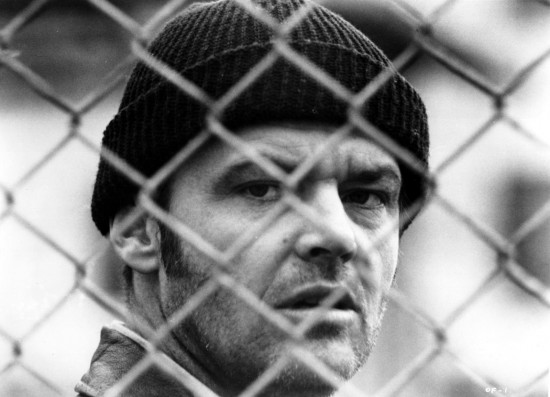Randle Patrick McMurphy
Monday, January 2nd, 2012
Jack Nicholson as R.P. McMurphy or “Mac” in One Flew Over the Cuckoo’s Nest.
The film is remembered as a comedy about the inmate revolt led by McMurphy, and the fishing trip, the all-night orgy, and his defiance of Nurse Ratched (Louis Fletcher)- but in fact it is about McMurphy’s defeat. One can call it a moral victory and rejoice in the Chief’s escape, but that is small consolation for McMurphy.
The film is based on Ken Kesey’s 1962 best-selling novel, which Pauline Kael observed “contained the prophetic essence of the whole Vietnam period of revolutionary politics going psychedelic.” Toned down for the 1970s into a parable about society’s enforcement of conformism, it almost willfully overlooked the realities of mental illness in order to turn the patients into a group of cuddly characters ripe for McMurphy’s cheerleading. We discover that the Chief is not really mute, Billy need not stutter, and others need not be paralyzed by shyness or fear. They will be cured not by Nurse Ratched’s pills, Muzak, and discussion groups, but by McMurphy liberating them to be guys- to watch the World Series on TV, go fishing, play pickup basketball, get drunk, get laid. The message for these wretched inmates is: Be like Jack.
The movie’s simplistic approach to mental illness is not really a fault of the movie, because it has no interest in being about insanity. It is about a free spirit in a closed system. Nurse Ratched, who is so inflexible, so unseeing, so blindly sure she is right, represents momism at its radical extreme, and McMurphy is the Huck Finn who wants to break loose from her version of civilization…
…Nicholson’s performance is one of the high points in a long career of enviable rebels. Jack is a beloved American presence, a superb actor who even more crucially is a superb male sprite. The joke lurking beneath the surface of most of his performances is that he gets away with things because he knows how to, wants to, and has the nerve to. His characters stand for freedom, anarchy, self-gratification, and bucking the system, and often they also stand for generous friendship and a kind of careworn nobility. The key to the success of his work in About Schmidt is that he conceals these qualities- he becomes one of the patients, instead of the liberating McMurphy.
———– Roger Ebert, The Great Movies II
A Johnny Cash song that I recently came across that shares a similar beat with Nicholson’s performances, “What is Truth?”
[audio:http://www.rickstate.com/wp-content/uploads/2012/01/Johnny-Cash_The-Legend_18_What-Is-Truth.mp3|titles=Johnny Cash_The Legend_18_What Is Truth]
